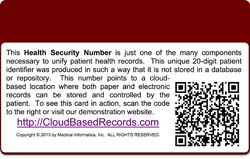EHRs can't do everything

Medical Informatics, Inc., a medical organization based in Rockville, MD, in partnership with Health Tech Hatch, a crowdfunding site, for innovative healthcare projects, is taking a consumer-centric approach to address this industry-wide struggle to achieve interoperability with its My Medical Records project. The project is currently seeking funding on Indiegogo.com.
Steve Behram, MD, president and co-founder of Medical Informatics, Inc., explained the project’s impetus in an interview with Healthcare IT News: “The question that came up for us is how can we bring together paper-based records and branded EMR records? …How can we make the systems talk to each other?”
With the My Medical Records project, Behram and his team aim to unify patient records with the patients themselves by developing an open-source portal through which patients could access all of their health records at the same time, irrespective of the provider, or record system, from which they originate. For every patient, the portal would generate a Unique Patient Identifier, or UPI. A patient’s UPI would not be stored in a central database, but belong to the patient alone. Patients can then use a Health Security Card on which their UPI is imprinted to tag records from their healthcare encounters. The service transfers tagged records to a secure cloud-space that patients can access at any time, along with anyone else, for example, a physician, they grant permission to do so.


“The patient becomes the intermediary that carries all the information with them as they go from one site to another,” said Behram, “so we look at this as a bridging solution, not an EHR solution. Looking at it this way, the providers are free to choose whichever EMR/EHR vendor they choose…they can choose to stay on paper if they wish to.”
To overcome the issue posed by paper records, the project will have a fax-to-cloud functionality. Patients will be able to fax any paper records, then tag the file to send it to their unified record. This functionality will also allow patients to circumvent non-participating record systems, too, as the patient could request a printed version of their record, and then follow the aforementioned procedure.
While the project’s initial objective is to grant patients the basic ability to access their records, Behram envisions that subsequent roll-outs will include numerous additional features, such as notifying patients of uploaded lab results or when someone has accessed your records as well as allowing third parties to build onto the basic system, customizing it to suit specific institutional needs: “The way I would look at this is that the very first step is connectivity followed soon by additional features that I think other providers, vendors, and other people can add on to the open source architecture.”
Behram pointed out that this project, by facilitating distributed decision-making, could help curb redundant testing and medical errors due to poor communication among providers, two areas with significant potential savings.
My Medical Records will lay its costs on neither the patients nor providers. Subscription is free for both. In fact, the service will even compensate providers for publishing content to the portal. To offset projects costs, Behram hopes to create volume at the level of the portal via provider content contributions and, like social media platforms, garner third- party interest to monetize the portal.
The consumer-driven business model of My Medical Records is reflected in Behram and his team opting for a grassroots approach to funding, as they want to harness their users’ approval to develop the project, but not have providers or patients shouldering the financial burden of sustaining it.
“What we’re trying to do is get the word out that there may be a better way to bridge these records,” said Behram, “and we want patients to buy into this and we want providers to buy in to this.”
Behram hopes to raise $100,000 for My Medical Records on Indiegogo.com. The project’s campaign began 15 October 2013 and ends 29 November 2013.

























